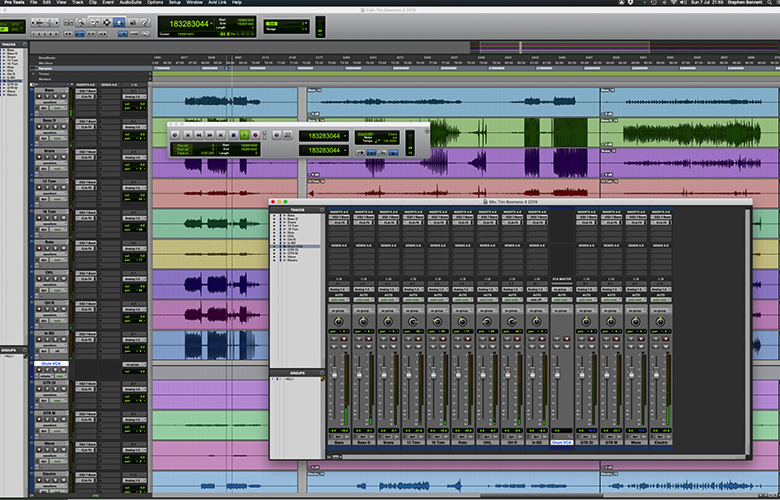
A few years ago, when I was fresh out of college and looking for jobs, I remember reading an article that explained why Pro Tools is the industry standard and why every audio professional needs to make it their DAW of choice, whether they work in music, film/TV, game audio or podcast production.
In addition to this, I found that a lot of radio and podcast job adverts were very specific about the software they required people to know how to use (usually Pro Tools, Logic, or Reaper, but mainly Pro Tools).
It got me thinking about how many of us use a particular DAW simply because we’ve been told it’s the best one, rather than choosing one that suits our individual needs. Obviously, it makes sense to have an understanding of different ones (if nothing else, you’ll learn what you like/don’t like working with), but is it fair to reject a job candidate on the basis that they have a preference for one DAW over another? I don’t think it is.
It’s what I use in my day-to-day freelance work, what I used in my last full-time job, and what I used during my studies. Before that, I learned how to use Pro Tools and have also experimented with other DAWs in the past. But I don’t mind admitting that Audition is the one I feel most comfortable with. It wouldn’t be the best choice for music production, for example, but for radio and podcasting, it’s perfect. It’s widely used for this purpose, yet most production companies still require those they hire to have Pro Tools expertise.
It’s a fantastic and versatile DAW that undoubtedly works for a lot of people. I also understand that companies will have a particular setup and employees obviously need to know how everything works. But if someone is experienced in their field — enough to actually be hired — should it really matter if they’ve used a different DAW up to now? I’m not saying it’s easy to just jump into a piece of software that you’ve never used before, but it is entirely possible to learn (quickly) on the job. I’ve had colleagues in the past who had only used Pro Tools and had to learn Adobe Audition on the fly. But they still got hired in the first place because they were good at their jobs, not because of the DAW they used. I feel the same thing should happen with those who may not have much (or any) experience with Pro Tools.
If you’re a freelancer who chooses their own clients and projects, the DAW you use should be even less relevant to the people you’re working with. I haven’t yet had a client question my setup (unless there’s a situation that requires us to collaborate on an edit or share sessions, but those have been few and far between) but if they did, I would want to know if there was a good reason for needing to use a different DAW. I’ve never been in a situation where Audition didn’t meet my needs or allow me to deliver a project successfully.
To sum up, I think we can easily get bogged down by the term ‘industry standard’. What matters most is a person’s own skills and qualities and what they can bring to the table. The software they use is secondary.
How to Own Your Work Without it Owning You
Essentials & Creativity of Location Sound


The mission of SoundGirls.org is to inspire and empower the next generation of women in audio. Our mission is to create a supportive community for women in audio and music production, providing the tools, knowledge, and support to further their careers. SoundGirls.Org was formed in 2013 by veteran live sound engineers Karrie Keyes and Michelle Sabolchick Pettinato and operates under the Fiscal Sponsorship of The California Women’s Music Festival, a 501(c)3 non-profit organization. In 2012, Karrie and Michelle participated in the “Women of Professional Concert Sound” panel at the AES Conference in San Francisco. The panel was hosted by the Women’s Audio Mission (WAM) and moderated by WAM founder Terri Winston. Terri brought together five women working in live and broadcast audio. The groundbreaking panel (which also included Jeri Palumbo, Claudia Engelhart and Deanne Franklin), provided young women and men a glimpse into life on the road, tips and advice, and a Q & A with the panelists. More importantly though, was how incredibly powerful the experience was for the panelists. We had all been in the business for 20 years or more, yet most of us had never met before that day and within minutes we bonded like long-lost sisters. We were struck by how similar our experiences, work ethics, and passions were and wondered why our paths had never crossed and how our careers would have been different had we been there to support each other through the years. Each of us are strong on our own, but together we were even stronger and a powerful force. We were empowered. Each of us had been asked hundreds of times in our careers: Are there other women doing sound? How did you get into sound? How would a young woman go about getting into sound? Through creating SoundGirls.Org, we hope to establish a place for women working in professional audio to come for support and advice, to share our success and failures, our joys and frustrations, and for empowerment and inspiration.
Read Full Profile© 2021 TheatreArtLife. All rights reserved.

Thank you so much for reading, but you have now reached your free article limit for this month.
Our contributors are currently writing more articles for you to enjoy.
To keep reading, all you have to do is become a subscriber and then you can read unlimited articles anytime.
Your investment will help us continue to ignite connections across the globe in live entertainment and build this community for industry professionals.